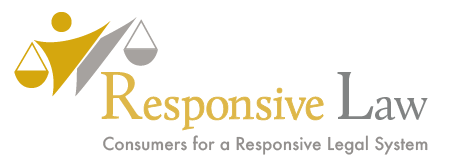Responsive Law Recommends Changes to DC Rule on Unauthorized Practice of Law
3/8/2016
Written by Bridgette Harrison
Responsive Law has issued comments to the DC Committee on the Unauthorized Practice of Law recommending improvements to the District of Columbia's rules on the unauthorized practice of law, or UPL. Responsive Law urged the committee to recommend revising the UPL law so non-lawyers would be able to offer legal services to the many low- and moderate-income people who can't afford to use a lawyer.
Responsive Law pointed out that UPL laws exist on top of consumer protection laws, so the broad scope of UPL restrictions is redundant with respect to protecting consumers, and exists primarily to protect lawyers. To make sure the UPL laws are serving consumers, not lawyers, Responsive Law specifically recommended changing the UPL law so that no UPL action may be taken when legal services are provided for free, and so that any UPL lawsuit requires a consumer complaint and proof of consumer harm.
Responsive Law also urged the commission to consider allowing non-lawyer staff at non-profits to provide legal services. Nonprofits are the perfect avenue to provide low cost legal services, as they usually specialize in offering community services in one area, making them experts on it. These nonprofits operate in the areas where there is the most unmet legal need, such as housing and domestic issues, and could provide their clients with understanding of the law as it pertains to these specific issues. The large range of expert nonprofit organizations in DC could provide assistance with their extensive knowledge of how the law pertains to these areas, giving advice to the people they already serve without cost or for very cheap. Furthermore, there is very low risk of consumer harm when nonprofits offer legal assistance in an area that is consistent with their missions. Nonprofits are not focused on making a profit; they are specifically focused on the interests of their constituencies, which would provide much of the consumer protection that UPL laws are ostensibly meant to provide. The current UPL laws keep knowledgeable people from being able to give free assistance to members of their community. Keeping nonprofits from being able to share their expert knowledge with the people they already serve only maintains the access to justice gap.
Responsive Law also highlighted several other types of legal help beyond lawyers that would help increase access to justice. One service Responsive Law asked the commission to consider is a version of the U.K.'s McKenzie friends, who are volunteer or low cost non-lawyers who provide guidance to unrepresented litigants in court. They provide moral support, help with case papers, give advice on courtroom conduct, and sit with the consumer while in front of the judge, giving litigants the confidence and assistance they need to navigate the complex court system. Responsive Law also suggested licensing new types of legal professionals that provide limited legal services, similar to the Washington State LLLT program. However, Responsive Law recognizes that the high barriers to becoming an LLLT in Washington State keep that program from providing the fullest potential of consumer help, and recommended a model with a lower licensing bar that would allow more people to be able to offer this kind of legal service.
Our comments to the commission can be read here.
Bridgette Harrison is a Responsive Law intern.
